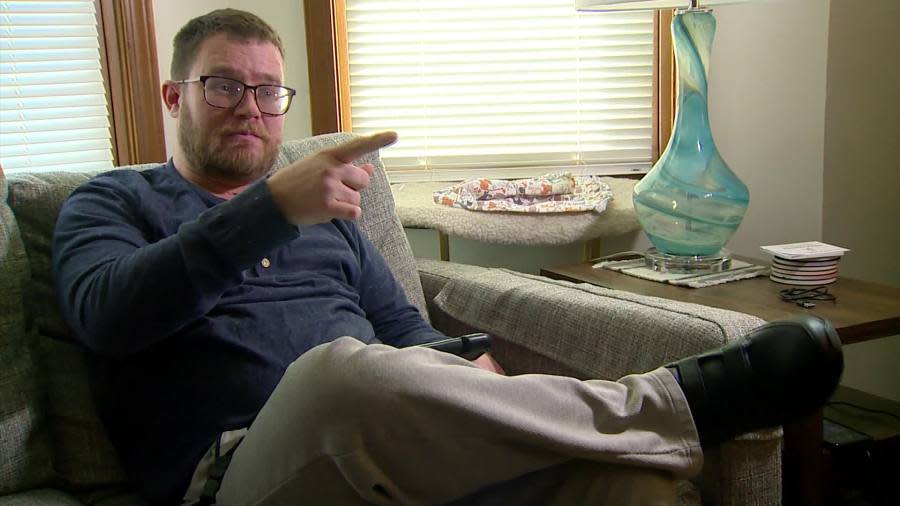Walker family ‘emotional’ after no-fault victory over State Farm
WALKER, Mich. (WOOD) — The Wieland family has been quietly celebrating a big win in its fight against State Farm.
“Very emotional,” Peg Wieland said of the family’s court victory last fall.
It’s been months since an Oakland County jury found in the Wielands’ favor after a trial, but the approximately $1 million judgment, signed by a judge in late October, has not been widely reported.
Walker family has hope after Michigan Supreme Court insurance ruling
“I was like, ‘Finally, someone gets it,'” Peg Wieland said of her reaction to the jury’s verdict. “I was almost in tears. It took a few minutes to sink in.”
Peg and Skip Wieland are caregivers for their son, Shawn, who suffered a traumatic brain injury in a 1997 car crash.

Shawn Wieland, 17 at the time, was momentarily distracted while behind the wheel of the family car. He’d been helping a friend move and wasn’t wearing a seatbelt when he collided with another vehicle.

Shawn Wieland suffered the most significant injuries.
“At that point in time, they really didn’t think he was going to live,” Peg Wieland said from the living room of their home in Walker. “After a week or so, (the doctor) said, ‘Well, Shawn might live, but if he does, he’s going to be a vegetable.'”
The doctor was wrong.
The Wielands devoted themselves to becoming Shawn Wieland’s full-time caregivers and advocates, and State Farm paid them for it, a benefit to which the family was entitled under Michigan’s no-fault system.
But when no-fault reforms took effect, the Wielands’ attorney said State Farm reduced payments.
Care providers say no-fault reforms could put them out of business
That’s despite court rulings that found changes to no-fault do not apply to those injured before the reforms’ passage in 2019.
“When the amendments to the no-fault law came, (State Farm) cut benefits to just ridiculous levels,” said the Wielands’ attorney, Nick Andrews, in a Zoom interview with Target 8. “They told the family they couldn’t provide more than eight hours of care a day. Of course, Shawn needs 24/7 care.”
Despite Shawn Wieland’s incredible progress under his parents’ care, the 43-year-old still can’t talk, has cognitive difficulties, struggles with left-side weakness and is prone to choking.
Andrews said State Farm stopped paying the Wielands altogether for months.
“It was really bad,” explained Peg Wieland. “We maxed out credit cards, borrowed money from family.”
But the jury ultimately sided with the Wielands and found the “reasonable market value of the attendant care services provided to Shawn Wieland was $29.38 per hour.”
State Farm has already appealed the $1 million judgment.
“As you may be aware, this case was initially about what is a reasonable hourly rate for attendant care,” wrote State Farm in its response to Target 8’s email seeking comment. “State Farm is not appealing the hourly rate awarded by the jury. The appeal is limited to interest calculations, which were miscalculated, and the attorney fee award.”
It can take 18 months for cases to work their way through the Michigan Court of Appeals.
Meanwhile, the Wielands and their attorney are encouraging lawmakers to pass “bad-faith” bills that would penalize insurance companies that intentionally underpay, delay or deny benefits owed.
But critics of the bills are pushing back.
“There’s already a proven path in place for people to challenge insurance companies if they don’t think that they are getting the right amount of benefits,” said Mike Van Beek of the Mackinac Center in a Zoom interview with Target 8.
Van Beek said the Wielands’ court victory proves the system is already holding the highly-regulated insurance industry accountable.
At the same time, Van Beek believes the Wieland case also reveals one of the problems with Michigan’s system.
“The car accident victim and their family got benefits worth about $500,000, but their attorneys got even more than what they won in benefits,” remarked Van Beek. “(Our system) creates incentives for attorneys to file lots of lawsuits. … The more expensive the attorneys are that we pay for these legal cases, the more our premiums cost.”
Van Beek thinks the “bad-faith” bills are designed to make it easier for attorneys to file suit.
He also noted that, depending on the methodology used to rank auto insurance rates by state, no-fault reform is reducing premiums in Michigan, albeit gradually.
“We’ve seen a steady decrease in the average premium in Michigan,” Van Beek said. “I think that’s a good sign. … It’s a very complicated system of laws and regulations and the market, and all these other sorts of things influence the price that people pay for premiums, but we’re moving in the right direction.”
For the latest news, weather, sports, and streaming video, head to WOODTV.com.

